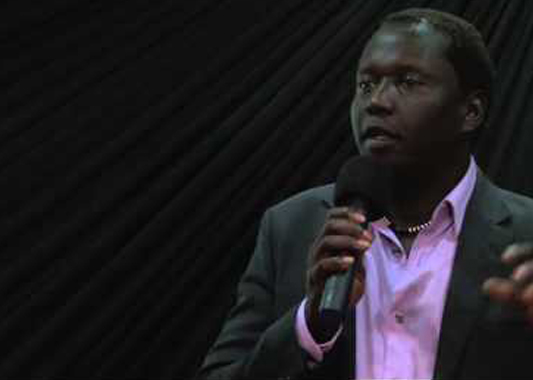Bashir’s Juba visit undermines justice principles: S. Sudanese group
November 18, 2012 (JUBA) – As South Sudan prepares to host the much-hyped presidential summit, a local think tank insists the Sudanese President’s visit to Juba largely ignores the principles of Justice, as both countries will try to revive their economies at the expense of the International Criminal Court (ICC) case.

“As a non-state party of the Rome statute, South Sudan could choose to ignore that question and conduct business with Al-Bashir as normally as has been the case so far,” said Jok Madut Jok, a co-founder of the Juba-based institute.
However, he said that by continuing to ignore the ICC question, the young state projects itself as “hypocritical” given its long standing dispute with Sudan, witnessed through many years liberation wars and bitter criticisms of the Khartoum regime.
Before independence, Jok said, South Sudan had long accused Khartoum of genocide in South Sudan, and to ignore the question of the arrest warrant for Al-Bashir, a man the country believes to have committed “genocide”, indeed looks “increasingly bizarre.”
Both President Al-Bashir and his South Sudan counterpart are due to meet in Juba for direct talks, which could revive the economies of the two countries, after months of a deadlock over exporting South Sudan’s oil through Sudan and other issues.
The move comes in the aftermath of the 27 September agreements reached between the two leaders in the Ethiopian capital, Addis Ababa with facilitation from the African Union High Level Implementation Panel (AUHIP).
The planned Juba summit, analyst say, could mainly focus on security issues, establishing the military buffer zone, oil and the other economic issues affecting the two countries. However, like in the previous meeting, both countries will be cautious on border issue, especially over Abyei and other territories that South Sudan believes Sudan illegally claims.
“The visit and the summit between the two presidents will be an opportunity for the two countries to redraw each other’s attention to the concept of two viable states living side by side in harmony with each other, a concept that was largely the foundation of the Comprehensive Peace Agreement that ended the protracted war between the two sides,” Jok noted.
The summit, he added, will be an attempt to build some trust to replace the current climate of mistrust due to Khartoum’s “tradition of signing agreements that it does not intend to implement.”
South Sudan, on Sunday, announced it has rescheduled plans to resume its oil production and exports through neighbouring Sudan, until the two countries reach a consensus over security issues.
Khartoum has said it will not allow Southern crude to be exported until the border buffer zone is established and it is satisfied that Juba has severed all ties from Sudanese rebel groups. Juba denies backing any armed groups north of the border.
(ST)
